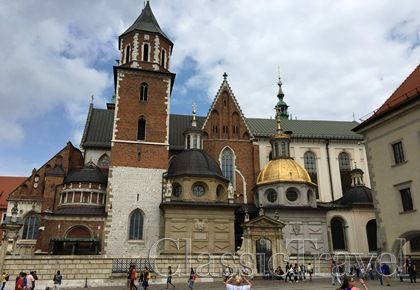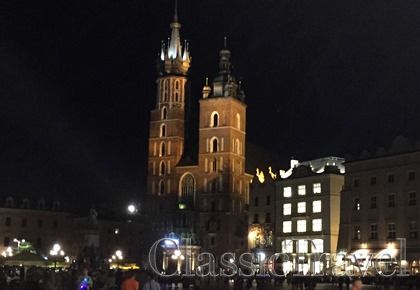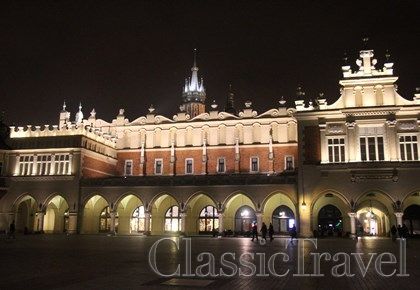Poland Express



Poland Express
Central & Southern Poland
This trip is for those with little vacation time - in 6 days you'll see the best of southern Poland including Warsaw - Poland’s Capital, Cracow - Poland’s historical and cultural capital with a trip to Zakopane - Poland’s mountainside. The trip also includes shorter tours to Poland’s top attractions like: Wieliczka salt mine from 13th century or Czestochowa - Poland's spiritual Capital with the famous shrine of Black Madonna.
Day 1: WARSAW
Arrival. Check-in at the hotel.
Day 2: WARSAW
All-day sightseeing in Warsaw: New and Old Town Market, Royal Castle, walk in Krakowskie Przedmieście and Nowy Świat. Łazienki Park and Palace, Warsaw Uprising Museum. Dinner in a stylish restaurant. Return to the hotel.
Day 3: SULEJÓW – CZĘSTOCHOWA
Departure from Warsaw to Częstochowa. On the way visit to a 12th century Cistercian abbey in Sulejów - one of Europe’s most interesting fortifications. Częstochowa: check-in at the hotel. In the afternoon a walk to the Jasna Góra Pauline Monastery, a sacred place of the Polish people.
Day 4: THE TRAIL OF THE EAGLES' NESTS and OJCÓW NATIONAL PARK
Departure for the Trail of the Eagles' Nests; visiting the ruins of medieval castles and natural sights. In the afternoon trip through the Ojców National Park to Kraków. Free time in the evening. Overnight stay.
Day 5: KRAKÓW
All-day sightseeing tour in Kraków: Market Square, St. Mary's Church, Cloth Hall, a walk along the Royal Route to the Wawel Castle - visiting the chambers and armour room. In the afternoon a walk in the Jewish district in Kazimierz.
Day 6: AUSCHWITZ – WADOWICE
A visit to the former Nazi Concentration Camp from World War 2 in Auschwitz-Birkenau. In the afternoon visit to Wadowice, hometown of the Pope John Paul II. In the evening arrival in Zakopane for an overnight stay.
Day 7: ZAKOPANE
All day in the Tatra Mountains: by ski-lift to Gubałówka, walk in the town, Tatra Museum, buying souvenirs, Our Lady of Fatima Church in Krzeptówki. Overnight stay.
Day 8: KRAKÓW
Transfer to the airport. Departure.
Warsaw
Warsaw is the capital and largest city of Poland. It is located on the Vistula River, roughly 260 kilometres (160 mi) from the Baltic Sea and 300 kilometres (190 mi) from the Carpathian Mountains. Its population in 2012 was estimated at 1,802,398 residents with a greater metropolitan area of 2,631,902 residents, making Warsaw the 6th most populous city proper in the European Union. The area of the city covers 516.9 square kilometres (199.6 sq mi), while the city's agglomeration covers 6,100.43 square kilometres (2,355.39 sq mi).
Warsaw is an Alpha- global city, a major international tourist destination and an important economic hub in Central Europe. It is also known as the "phoenix city" because it has survived many wars throughout its history. Most notably, the city had to be painstakingly rebuilt after the extensive damage it suffered from World War II, during which 90% of its buildings were destroyed. On 9 November 1940 the city was awarded Poland's highest military decoration for heroism, the Virtuti Militari, for the Siege of Warsaw (1939).
Warsaw is the source for naming entities such as Warsaw Confederation, the Warsaw Pact, the Duchy of Warsaw, the Warsaw Convention, the Treaty of Warsaw, the Warsaw Uprising, the Warsaw Ghetto, and the Warsaw Ghetto Uprising. The Warszawianka is widely considered the unofficial anthem of the city.
Częstochowa
Częstochowa is a city in south Poland on the Warta River with 240,027 inhabitants (June 2009). It has been situated in the Silesian Voivodeship (administrative division) since 1999, and was previously the capital of Częstochowa Voivodeship (1975–1998). However, Częstochowa is historically part of Lesser Poland, not of Silesia, and before 1795, it belonged to the Kraków Voivodeship.
The town is known for the famous Pauline monastery of Jasna Góra, which is the home of the Black Madonna painting (Polish: Jasnogórski Cudowny obraz Najświętszej Maryi Panny Niepokalanie Poczętej), a shrine to the Virgin Mary. Every year, millions of pilgrims from all over the world come to Częstochowa to see it. The city was became home to the Frankism religion in the late 18th and 19th Century. There is also a Lusatian culture excavation site and museum in the city and ruins of a medieval castle in Olsztyn, approximately 25 kilometres (ca. 16 mi) from the city centre.
Kraków
Kraków also Cracow, or Krakow, is the second largest and one of the oldest cities in Poland. Situated on the Vistula River (Polish: Wisła) in the Lesser Poland region, the city dates back to the 7th century. Kraków has traditionally been one of the leading centres of Polish academic, cultural, and artistic life and is one of Poland's most important economic hubs. It was the capital of Poland from 1038 to 1569; the Polish–Lithuanian Commonwealth from 1569 to 1596; the Grand Duchy of Kraków from 1846 to 1918; and Kraków Voivodeship from the 14th century to 1999. It is now the capital of the Lesser Poland Voivodeship.
The city has grown from a Stone Age settlement to Poland's second most important city. It began as a hamlet on Wawel Hill and was already being reported as a busy trading centre of Slavonic Europe in 965. With the establishment of new universities and cultural venues at the emergence of the Second Polish Republic and throughout the 20th century, Kraków reaffirmed its role as a major national academic and artistic centre. The city has a population of approximately 760,000 whereas about 8 million people live within a 100 km radius of its main square.
After the invasion of Poland by Nazi Germany at the start of World War II, Kraków was turned into the capital of Germany's General Government. The Jewish population of the city was moved into a walled zone known as the Kraków Ghetto, from which they were sent to extermination camps such as Auschwitz and the concentration camp at Płaszów.
In 1978, Karol Wojtyła, archbishop of Kraków, was elevated to the papacy as Pope John Paul II – the first Slavic pope ever, and the first non-Italian pope in 455 years. Also that year, UNESCO approved the first ever sites for its new World Heritage List, including the entire Old Town in inscribing Cracow's Historic Centre.
Wieliczka Salt Mine
The Wieliczka Salt Mine, located in the town of Wieliczka in southern Poland, lies within the Kraków metropolitan area. Opened in the 13th century, the mine produced table salt continuously until 2007, as one of the world's oldest salt mines in operation. Throughout, the Royal mine was run by the Żupy krakowskie Salt Mines company.
Commercial mining was discontinued in 1996 due to low salt prices and mine flooding.
The mine's attractions include dozens of statues and four chapels carved out of the rock salt by the miners. The older sculptures have been supplemented with new carvings made by contemporary artists. About 1.2 million people visit the Wieliczka Salt Mine annually.
The mine is one of Poland's official national Historic Monuments, as designated in the first round, 16 September 1994. Its listing is maintained by the National Heritage Board of Poland.
The Wieliczka Salt Mine helped inspire the Labyrinth scenes in Bolesław Prus' 1895 historical novel, Pharaoh. Prus combined his powerful 1878 impressions of the salt mine with the description of the ancient Egyptian Labyrinth, in Book II of Herodotus' Histories, to produce the remarkable scenes found in chapters 56 and 63 of his novel.
The Wieliczka salt mine reaches a depth of 327 meters and is over 287 kilometres (178 mi) long. The rock salt is naturally grey in various shades, resembling unpolished granite rather than the white or crystalline look that many visitors may expect. In the 13th century, rock salt was discovered in Wieliczka and the first shafts were dug.
Zakopane
Zakopane is a town in the extreme south of Poland. It lies in the southern part of the Podhale region at the foot of the Tatra Mountains. From 1975 to 1998 it was in Nowy Sącz Province, but since 1999 it has been in Lesser Poland Province. It had a population of about 28,000 as of 2005. Zakopane is a center of Góral culture and is known informally as "the winter capital of Poland". It is a popular destination for mountaineering, skiing, and qualified tourism.
Zakopane is located in southernmost Poland near the border with Slovakia. It lies in a valley between the Tatra Mountains and Gubałówka Hill. It can be reached by train or by bus from district capital Kraków, which is about two hours away. Zakopane has an elevation of 800-1,000 meters above sea level. The town is centered at the junction of Krupówki and Kościuszko Streets.
The earliest documents mentioning Zakopane date to the 17th century, describing a glade called Zakopisko. In 1676 it was a village of 43 inhabitants. Zakopane became a center for the region's mining and metallurgy industries; in the 19th century, it was the largest center for metallurgy in Galicia. It expanded during the 19th century as the climate attracted more inhabitants. By 1889 it had developed from a small village into a climatic health resort of 3,000 inhabitants. Rail service to Zakopane began October 1, 1899.
Cost: starting at $1,390
• Prices listed per person in 2-person room, min. 2 persons traveling
• Single supplement: $TBA
Price includes:
• 7 nights in DBL/TWIN rooms in 4* centrally located hotels (as listed below or their equivalents):
2 nights in 4* Mercure City Center (or similar)
1 night in 4* Arche Czestochowa (or similar)
2 nights in 4* Mercure Old Town Krakow (or similar)
2 night in 4* Crocus Zakopane (or similar)
• 7 breakfasts
• Transfers by comfortable car/minivan/bus
• English speaking assistant throughout the tour (driver-assistant for groups of less than 7 pax)
• Entrance fees and guides (Warsaw, Krakow)
Price excludes:
• International flights
• Tips for guide and driver
• Trip insurance
• Lunches & dinners
• Services not mentioned in itinerary
• Optional tours
Additional comments:
• Price may change due to fluctuation of USD to PLN
• If you plan on taking part in this trip with a group of 10 or more friends/relatives and would need a connecting flight to reach the starting destination of the trip (NYC) there is the possibility of receiving group discounts on the connecting flight. Please contact as soon as possible if this is the case.
• In the event that there is an odd number of group participants, the person to last join the group will be required to buy a single supplement for the trip or, when possible, share a 3 person room.
Trip Reservation
In order to secure a reservation for this trip each participant must pay a deposit of $500 and complete and sign a trip participation form. For guided group trips the number of space is limited – reservations are accepted in the order that they are received in. Full payment is required 60 days before departure. If the departure date is already within 60 days, then full payment is required immediately. If payment is not made in this time frame, the trip price as well as a spot reserved on the trip are not guaranteed.
For the quickest turnaround, please request your reservation through our website (use the “Request Reservation” option on the trip page). Our agents will email you with the invoice, payment options, all applicable forms, and instructions on how to complete the reservation. You may also request a reservation by emailing us at classic@classic-travel.com, or by calling our office toll free 1-800-774-6996.
Trip Cancellation
Any cancellation by a client must be made in writing and be acknowledged by the company in writing (mail/email/fax). The date on which the request to cancel is received by the company or its agents will determine the cancellation fees applicable. The cancellation fees are expressed hereafter as a percentage of the total tour price, excluding insurance.
• Cancellation 90 or more days before the trip: return of deposit, less $50 for office fees.
• Cancellation 89-60 days before departure: Loss of entire deposit.
• Cancellation 59-31 days before departure: 50% of cost of services booked.
• Cancellation less than 30 days before departure: 100% of cost of services booked.
Cancellation of trip by Classic Travel
Classic Travel reserves the right to cancel a trip under any circumstances. Cancellation cannot be made under 60 days to trip departure date, except under circumstances of "Force Majeure," which our agency has no influence or control over.
When it comes to trip cancellation, the client has the following options:
• Use the trip deposit payment towards another trip as a deposit or partial payment (if the amount is larger than $500).
• Receive a full refund of the paid deposit for the canceled trip
Classic Travel is not responsible for any costs incurred to the clients in preparing for the trip.
Required Documentation
Trip participants must be in possession of a valid passport, any applicable visas, and their insurance policy. Passport must be valid 6 months past the return date. It is highly recommended that participants have at least three photocopies of these documents. The trip participant accepts full responsibility for obtaining all such documents and is responsible for any adverse consequences resulting from missing or defective documentation. At the time of booking Classic Travel will advise on what documents are required for your trip.
Travel Documents Issued by Classic Travel
No later than two weeks prior to departure, all trip participants will receive via mail and/or email a packet that contains flight tickets (if purchased through Classic Travel), a detailed trip itinerary, additional information & brochures, baggage tags, and a list of suggested items to bring.
For the complete terms and conditions, click here.
Travel Insurance
Insurance is not included in the cost of this trip. Medical insurance is mandatory for all trips and it is up to the trip participant to choose an insurance package that fits their needs. Prior to the commencement of the trip, Classic Travel will request all trip participants to provide a copy of their travel insurance certificate. Medical insurance should cover accident and sickness expenses and emergency evacuation.
We also highly recommend that cancellation insurance is purchased. This will allow you to recover your costs in case you must cancel the trip due to an unforeseen circumstance (sickness or death of yourself or a close family member, extreme weather conditions, terrorism, loss of employment, etc).
Travel insurance can be purchased through Classic Travel - our plans are available to all our clients regardless of nationality and residency. We offer travel medical insurance as well as more comprehensive insurance packages that cover trip cancellation, trip interruption, travel delay, baggage loss, and more. During the reservation process we will provide you with our insurance options and rates.
You may choose to purchase travel insurance with us or with any other venue, so long as you are insured!
Click here to learn more about travel insurance.
-
Author: Eileen Ziegler (Trip Participant)Travel date: October 2019Date posted: 25 October 2019


